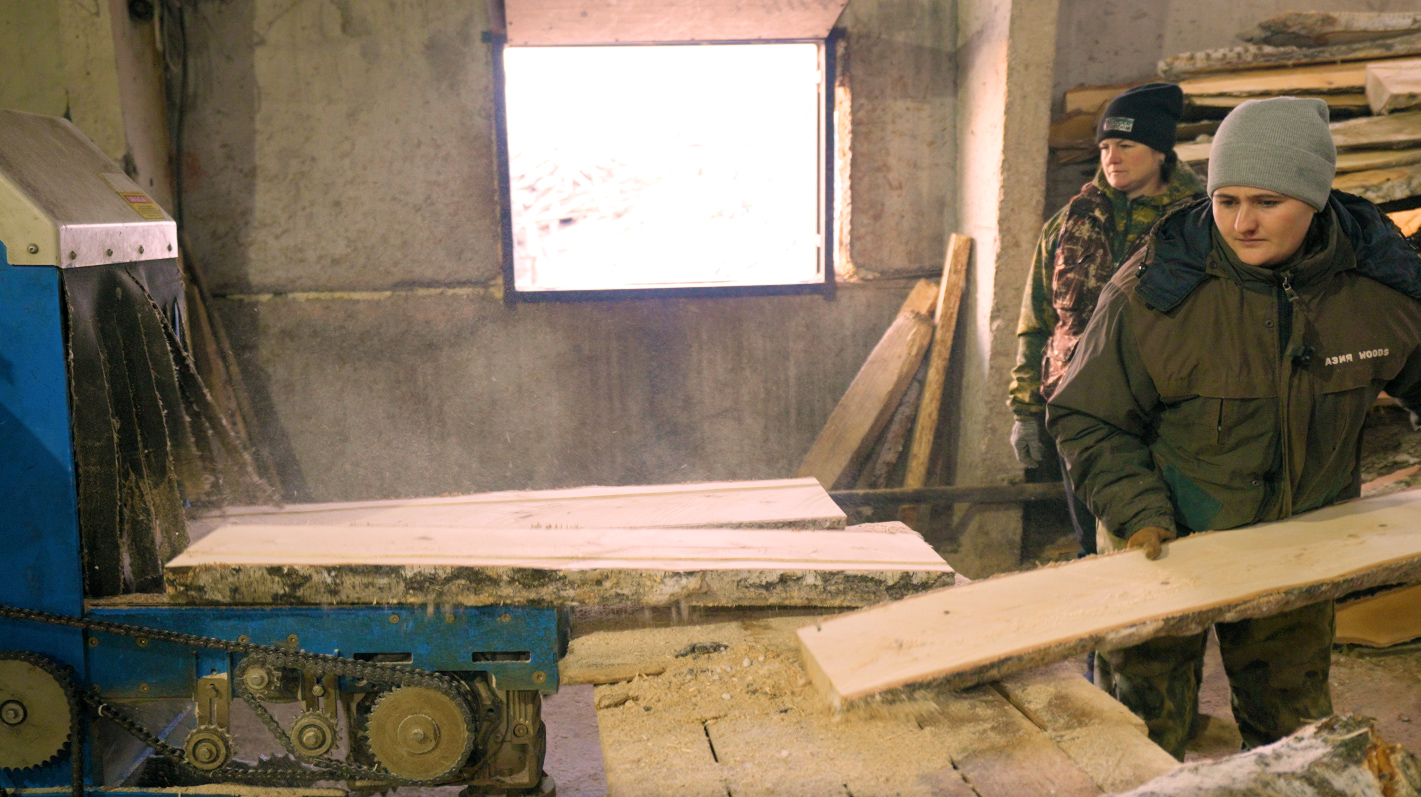Bringing sustainable heating solution for rural Kazakhstan
November 17, 2023

Briquettes
In Bulayevo town, North Kazakhstan, Yuliya Andreyevskaya's day begins with the hum of machinery processing timber. In this cold climate, where heating is a necessity for almost half of the year, Yuliya has relied on wood and coal to keep her family warm. Now, envisioning a "greener" town, her workplace transforms wood chips and sawdust into eco-friendly fuel.
In 2022, UNDP experts conducted a comprehensive study on the opportunities of using "green" technologies in the agricultural sector and rural areas. As part of a joint initiative with the National Chamber of Entrepreneurs "Atameken," North Kazakhstan was selected as a pilot region to introduce biomass briquettes for heating.

Yuliya Andreyeevskaya is working at a wood production company
"More than 300 cubic meters of timber are produced by our company per month, resulting in about 100 tons of sawdust per year. The proportion of wood waste in our company averages 20 percent. In addition, waste is generated from the logging activities of six forestry operations. Therefore, it would be great if we could recycle the waste instead of just throwing and burning it,"explains Yuliya, working at a wood production company.

Yuliya at the wood production site
A few miles away in Chkalovo village, Galina Vais echoes Yuliya’s sentiments. Walking through the fields of the mixed livestock farm, Galina envisions straw and sunflower waste as a source of sustainable warmth for her village. She believes that recycling agricultural waste into fuel briquettes is a promising area for the near future, helping local communities switch to cleaner fuel for heating.

Galina Vais at the farming observing straw wastes
"We have a lot of waste from our operations that we normally find difficult to recycle. The new equipment will help us to recycle waste and produce briquettes. We plan to distribute these in our community to those in need,"says Galina.
Briquettes, an alternative to gas, coal, and wood, are environmentally friendly fuel made from agricultural and wood waste such as sawdust, straw, sunflower husks, buckwheat, and flax fire, among others. Offering several benefits, fuel briquettes burn cleanly with minimal smoke, ensuring a consistent temperature throughout their entire burn. Impressively, a single briquette can last for four hours, and their high calorific value surpasses that of regular firewood, nearly matching the calorific value of coal. In summary, fuel briquettes stand out for their efficiency, cleanliness, temperature stability, and impressive calorific value.
In 2023, thanks to the joint initiative of the UNDP and the Ministry of Agriculture of the Republic of Kazakhstan, the companies where Yuliya and Galina work received financial support for their investments in equipment to process biomass waste into fuel briquettes. The grant aims to support local small and medium-sized enterprises by enabling them to set up production lines for waste briquettes, bring them to market, and offer these environmentally friendly alternatives to socially disadvantaged communities.
In Kazakhstan, agricultural waste is primarily reused as fertilizer, animal feed and bedding. A significant proportion of this waste either decomposes naturally or is incinerated, causing environmental damage. The briquettes offer both environmental and social benefits. They burn longer, cleaner, and hotter than coal and wood, while their use results in the reduction of harmful emissions, contributing to better air quality for public health.
This new UNDP initiative also focuses on economic benefits, creating new jobs, and helping local communities, like those in Bulayevo and Chkalovo, generate their livelihoods.

Galina and her co-worker are preparing straw wastes for recycling
"Our company is small, currently with 15 employees, including three women, but we're mighty. And there’s a lot more to come,"says Galina.
Yuliya notes that the company she works for has invested more than 100 million tenge and created 100 jobs. With the capacity to install waste recycling equipment, the company plans to hire more workers in the nearest future.

Yuliya Andreyeevskaya, a resident of Bulayevo town, North Kazakhstan
"Before this initiative, I hadn't considered options beyond wood and coal for our heating and cooking needs. With the new technology at hand, we can contribute to making our town a greener and safer place for people,"shares Yuliya.

 Locations
Locations